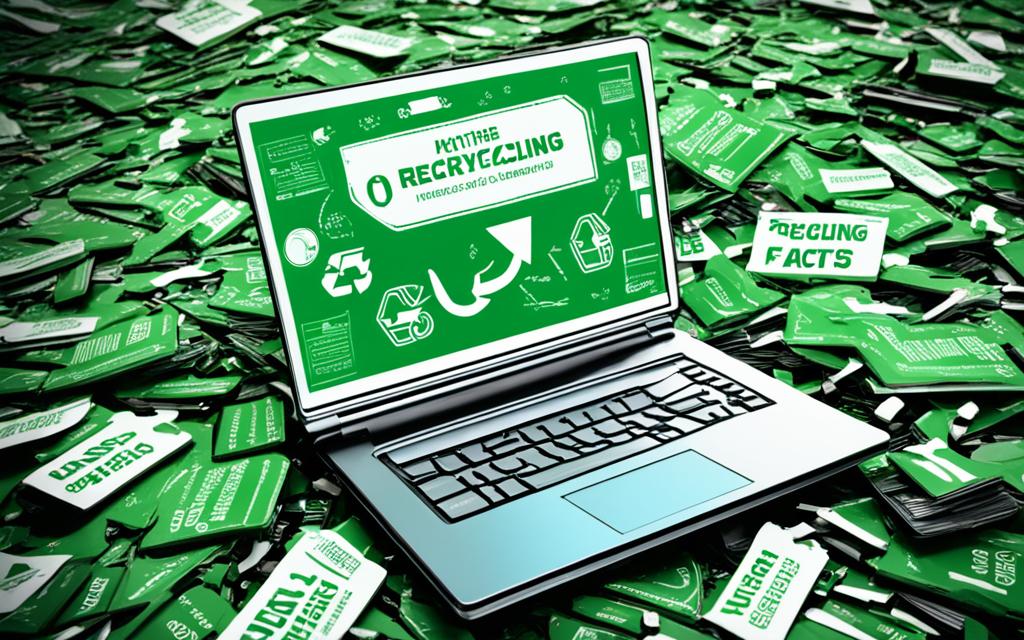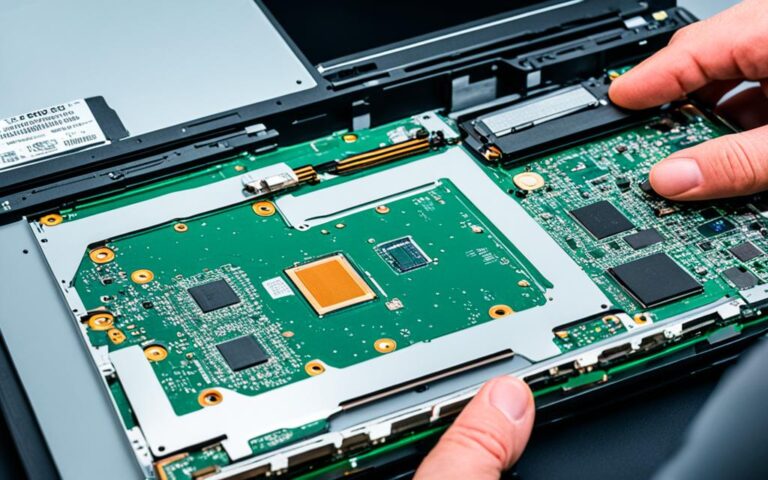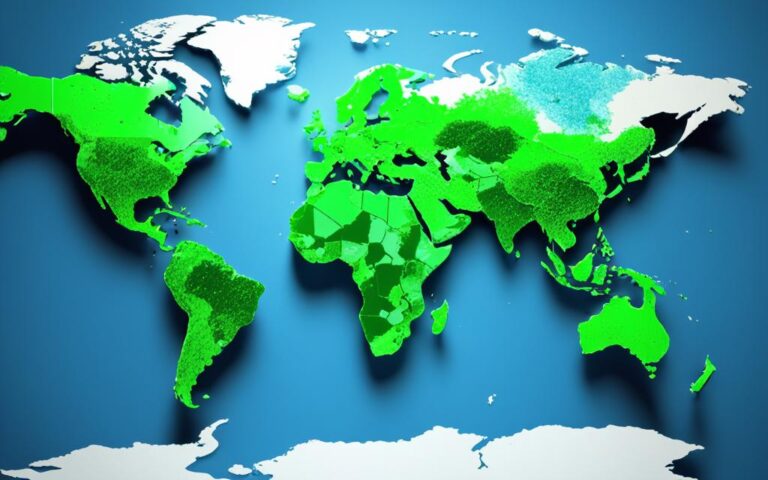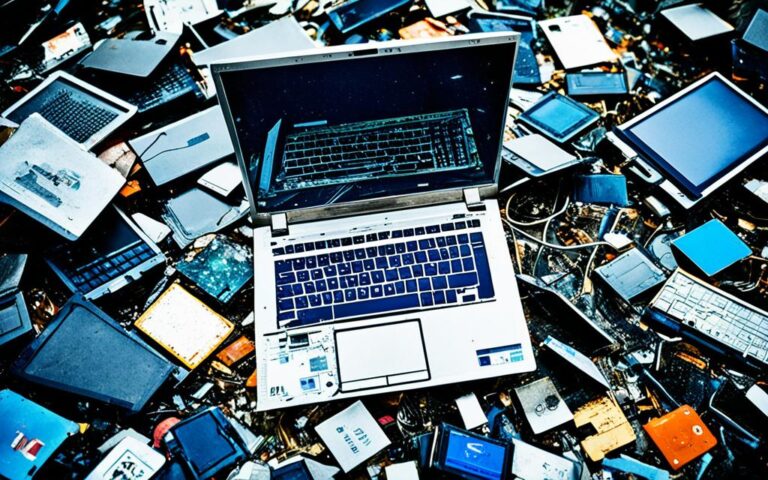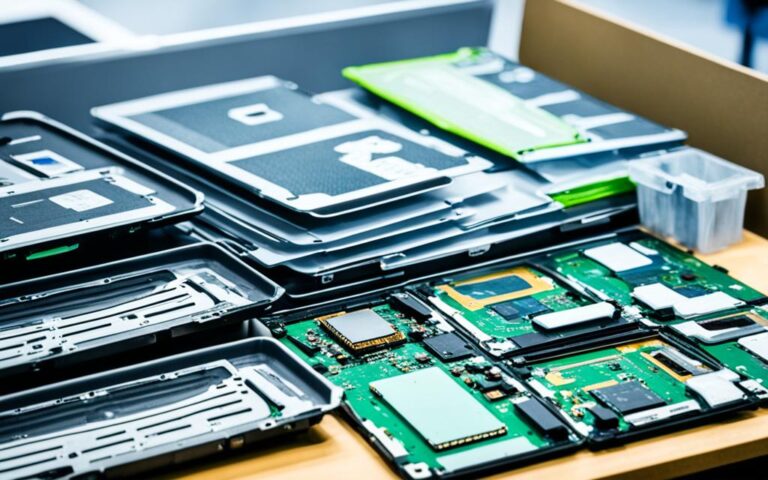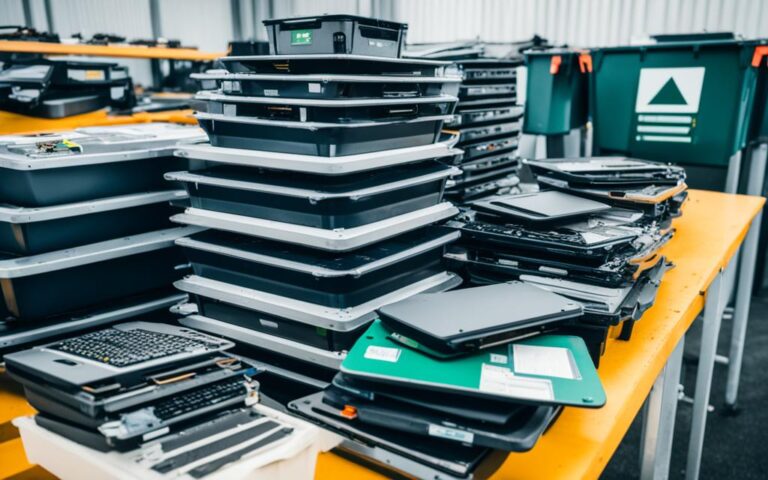Laptop Recycling: Myths vs. Facts
Welcome to our article series on laptop recycling. In today’s digital age, electronic waste, or e-waste, has become a growing concern. As laptops and other electronic devices become outdated or unusable, it’s crucial to address the proper disposal and recycling of these items to minimize their environmental impact. In this article, we will debunk common myths surrounding laptop recycling and provide you with the facts you need to know.
Let’s explore the truth behind these myths and shed light on the importance of responsible laptop recycling. By doing so, we can contribute to a cleaner and more sustainable future.
Myth: All E-waste Is Recyclable
When it comes to e-waste, it is a common misconception that all electronic devices can be easily recycled. However, this is not the case. Due to the presence of hazardous materials in certain electronics, not all e-waste is recyclable. It is essential to understand which devices contain these hazardous substances and require proper disposal methods.
One example of e-waste that poses a recycling challenge is CRT monitors. These monitors contain lead, a highly toxic substance that can have detrimental effects on the environment and human health if not handled correctly. Disposing of CRT monitors in regular landfills can lead to the release of lead into the soil and water, causing contamination.
To properly recycle e-waste that contains hazardous materials like lead, specialized recycling facilities and processes are required. These facilities can safely extract and handle the hazardous substances, preventing them from polluting the environment.
Myth: E-Waste Recycling Is Expensive
E-waste recycling is often perceived as an expensive endeavor, deterring many individuals and businesses from embracing this sustainable practice. However, this is a common misconception. In fact, e-waste recycling can be highly cost-effective, bringing numerous benefits to both the environment and manufacturing industry.
One key advantage of e-waste recycling is the retrieval of valuable metals and materials found in electronic devices. These recovered resources, such as gold, copper, and silver, can be reused in the manufacturing of new products. By incorporating recycled materials, manufacturers can significantly reduce the costs associated with acquiring raw materials, which are often expensive and environmentally taxing to extract.
Moreover, proper e-waste recycling also helps to reduce the overall costs of managing electronic waste. When e-waste is disposed of in landfills, it not only poses environmental risks but also requires significant financial resources to handle and monitor effectively. By implementing recycling programs, both individuals and businesses can contribute to the efficient management of e-waste, resulting in long-term cost savings.
To truly understand the cost-effectiveness of e-waste recycling, it is crucial to consider the financial and environmental implications holistically. While there may be initial costs involved in setting up recycling infrastructure and processes, the long-term benefits far outweigh these expenses. By reducing the demand for new raw materials, minimizing waste in landfills, and promoting sustainable manufacturing practices, e-waste recycling proves to be a fiscally responsible and environmentally conscious solution.
Myth: E-Waste Recycling Is Only for Large Electronics
Contrary to popular belief, e-waste recycling is not limited to large electronics. In fact, small devices such as mobile phones, tablets, and laptops also contain valuable materials that can be extracted and reused. When we discard these small electronics without recycling them, we are essentially wasting precious resources.
Small electronics, despite their size, house valuable materials like gold, copper, and silver. These materials can be recovered through e-waste recycling processes and used in the production of new electronic devices. By recycling small electronics, we can reduce the need for extracting raw materials from the earth, minimizing the environmental impact of resource extraction.
E-waste recycling also plays a vital role in recovering rare earth metals, which are essential for the manufacturing of small electronic components. These metals are becoming increasingly scarce, and recycling them from small electronics helps preserve these valuable resources for future use.
“Recycling small electronics is not only environmentally responsible but also ensures that valuable materials are not wasted.”
“Recycling small electronics is not only environmentally responsible but also ensures that valuable materials are not wasted.”
– Mark Johnson, Environmental Scientist
The Value of Recycling Small Electronics
Let’s take a closer look at some of the valuable materials that can be extracted from commonly used small electronic devices:
| Device | Valuable Materials |
|---|---|
| Mobile Phone |
|
| Tablet |
|
| Laptop |
|
By recycling these small electronics, we not only contribute to the conservation of valuable resources but also help reduce the demand for raw materials. This, in turn, mitigates the environmental impact of mining and extraction processes.
Recycling small electronics is a crucial step towards sustainable e-waste management. It ensures that valuable materials are not wasted, reduces the strain on natural resources, and supports the circular economy. So, the next time you have a small electronic device that you no longer need, remember to recycle it at a designated e-waste recycling facility to make a positive impact.
Myth: E-Waste Recycling Is Only for Developed Countries
E-waste recycling is often associated with developed countries, but it is important to recognize that developing countries also have robust recycling programs in place. These programs aim to reduce the impact of e-waste on the environment and promote sustainability.
One example of a developing country with a successful e-waste recycling program is Kenya. In Kenya, there is a dedicated recycling program that collects e-waste from households, businesses, and schools. This initiative not only helps to properly dispose of e-waste but also creates job opportunities and contributes to the local economy.
By implementing recycling programs, developing countries are taking proactive steps towards managing e-waste responsibly. These programs not only address the environmental impact but also promote sustainability in these regions. Through recycling, valuable resources can be recovered and reused, reducing the need for raw material extraction and minimizing the strain on the environment.
E-Waste Recycling Programs in Developing Countries
It is worth highlighting the success and impact of e-waste recycling programs in developing countries. Here are a few key examples:
| Country | Recycling Initiatives |
|---|---|
| Kenya |
|
| Ghana |
|
| India |
|
These examples highlight the efforts of developing countries in tackling the e-waste problem at a local level. By implementing recycling initiatives, these countries not only address the environmental issues but also contribute to their own sustainable development.
E-waste recycling is not limited to developed countries. Developing countries have recognized the importance of sustainable waste management and are actively working towards responsible e-waste disposal. These recycling programs not only help reduce the environmental impact of e-waste but also contribute to the socio-economic development of these regions.
Myth: E-Waste Recycling Is Not Necessary
E-waste recycling is a crucial and necessary practice that must be embraced due to its significant impact on the environment. When e-waste is not properly recycled, it ends up in landfills, contaminating the soil and water with hazardous materials. This contributes to environmental pollution, posing risks to both human health and the ecosystem as a whole.
By engaging in e-waste recycling, we can mitigate these detrimental effects and create a more sustainable future. The recycling process ensures that valuable materials present in electronic devices, such as gold, copper, and silver, are salvaged and reused. This reduces the need for extracting raw materials from the earth, which in turn helps address pressing environmental concerns like deforestation and resource depletion.
Recycling e-waste not only prevents it from ending up in landfills, but also conserves raw materials and reduces the negative impact of extracting new resources. It is a responsible and necessary action for the preservation of our planet.
Furthermore, e-waste recycling promotes a circular economy, wherein materials are in a constant state of reuse and recycling. This approach minimizes waste generation, conserves resources, and reduces the energy required for manufacturing new products. It also stimulates the development of sustainable practices and technologies, creating opportunities for innovation and job creation within the recycling industry.
The Environmental Impact of Neglecting E-Waste Recycling
When e-waste is left unrecycled, it poses several environmental risks, including:
- Soil and water contamination: Hazardous substances present in electronic devices, such as lead, mercury, and cadmium, can seep into the soil and water, polluting vital natural resources.
- Air pollution: Improper disposal methods such as incineration can release toxic gases and pollutants into the atmosphere, contributing to air pollution and climate change.
- Resource depletion: Extracting raw materials for new electronic products requires extensive mining, which depletes valuable natural resources and contributes to habitat destruction.
- Ecosystem disruption: Improper disposal and contamination of e-waste can harm ecosystems and wildlife, disrupting the delicate balance of life.
The Importance of Responsible E-Waste Recycling
In order to mitigate these environmental challenges, it is imperative that individuals, businesses, and governments take responsibility for proper e-waste recycling. By actively participating in recycling initiatives, we can:
- Reduce environmental pollution: Recycling e-waste prevents hazardous materials from contaminating the environment, protecting both ecosystems and human health.
- Conserve natural resources: Reusing valuable materials extracted from e-waste reduces the need for raw material extraction, preserving natural resources and minimizing the environmental impact of resource-intensive industries.
- Promote a circular economy: Recycling e-waste promotes a sustainable economic model, where materials are recycled and reused, minimizing waste generation and reducing the demand for new resource extraction.
By recognising the importance of e-waste recycling and taking active steps to recycle our electronic devices, we can make a significant positive impact on the environment and work towards a greener, more sustainable future.
Myth: E-Waste Recycling Is a Government Responsibility
While governments play a crucial role in e-waste recycling, it is important to remember that the responsibility does not rest solely on their shoulders. Individuals and businesses also have a role to play in properly disposing of their e-waste and contributing to a sustainable future.
E-waste recycling involves the proper disposal and recycling of electronic devices to prevent them from ending up in landfills where they can release harmful substances into the environment. While governments can implement policies and regulations to promote e-waste recycling, it is the collective responsibility of individuals and businesses to actively participate in the recycling process.
Individual Responsibility:
Every individual has a responsibility to recycle their e-waste. This includes old laptops, mobile phones, and other electronic devices that are no longer in use. By recycling these devices, valuable materials can be extracted and used to manufacture new products, reducing the need for raw materials and the environmental impact of resource extraction.
“Proper disposal of e-waste is everyone’s responsibility. By recycling our old electronics, we can minimize the environmental impact and contribute to a more sustainable future.”
Business Responsibility:
Businesses also have a significant role in e-waste recycling. They can implement e-waste reduction programs within their organizations to minimize waste generation. This can include initiatives like refurbishing and reusing old electronic devices, as well as partnering with certified recycling facilities to ensure proper disposal of e-waste.
By taking individual and business responsibility for e-waste recycling, we can collectively make a positive impact on the environment and contribute to a more sustainable future.
Benefits of Individual and Business Responsibility in E-Waste Recycling
- Reduces the environmental impact of e-waste by diverting it from landfills
- Conserves valuable resources by extracting and reusing materials from recycled electronic devices
- Creates job opportunities in the recycling industry
- Promotes sustainability and a circular economy
Conclusion
E-waste recycling plays a crucial role in addressing the ever-growing problem of electronic waste. By dispelling the myths surrounding laptop recycling and highlighting its benefits, we can promote a more sustainable approach to managing e-waste. It is not only beneficial to the environment but also cost-effective and essential in reducing the significant environmental impact caused by improper disposal.
One common myth is that all e-waste is recyclable. In reality, certain electronic devices contain hazardous materials that require proper disposal methods. For instance, CRT monitors often contain lead, which poses a risk to both the environment and human health. By adopting responsible recycling practices, we can ensure these harmful substances are handled in a safe and environmentally friendly manner.
Additionally, debunking the notion that e-waste recycling is expensive is vital. Recycling e-waste allows for the extraction of valuable metals and materials, which can be reused in the manufacturing of new products. This not only reduces the cost of production but also lowers the expenses associated with managing e-waste in landfills. Therefore, e-waste recycling is not only environmentally sound but also economically viable.
It is essential to recognize that e-waste recycling is not just limited to large electronic devices. Small electronics, such as mobile phones, tablets, and laptops, also contain valuable materials like gold, copper, and silver. By recycling these smaller devices, we can recover these precious resources and reduce the need for raw materials, contributing to a more sustainable future.
While e-waste recycling is often associated with developed countries, it is crucial to acknowledge that recycling efforts exist in developing countries as well. These programs not only help mitigate the detrimental effects of e-waste but also create new employment opportunities and promote sustainability initiatives.
Ultimately, e-waste recycling is a shared responsibility. While governments play a crucial role, individuals and businesses must also actively participate in the proper disposal and recycling of their e-waste. By embracing this responsibility, we can collectively reduce the environmental impact of e-waste and contribute to a healthier planet for future generations.
FAQ
Is all e-waste recyclable?
No, not all e-waste is recyclable due to the presence of hazardous materials. Certain electronics like CRT monitors contain lead, which is harmful to the environment and human health. Proper disposal methods are necessary for such e-waste.
Is e-waste recycling expensive?
No, e-waste recycling is not only beneficial to the environment but also cost-effective. Valuable metals and materials can be extracted from e-waste and used in the manufacturing of new products, reducing the cost of production. Additionally, proper recycling reduces the cost of managing e-waste in landfills.
Is e-waste recycling limited to large electronics?
No, e-waste recycling is not limited to large electronics. Small devices such as mobile phones, tablets, and laptops also contain valuable materials like gold, copper, and silver that can be extracted and reused. It is important to recycle small electronics as well.
Is e-waste recycling exclusive to developed countries?
No, e-waste recycling is not exclusive to developed countries. Developing countries also have recycling programs aimed at reducing the impact of e-waste. For example, Kenya has a recycling program that collects e-waste from households, businesses, and schools. Recycling in developing countries can create jobs and promote sustainability.
Is e-waste recycling necessary?
Yes, e-waste recycling is necessary due to its significant impact on the environment. When e-waste is not recycled, it ends up in landfills, contaminating soil and water with hazardous materials. Recycling also reduces the need for raw materials, helping to address environmental issues like deforestation.
Is e-waste recycling solely the government’s responsibility?
No, e-waste recycling is not solely the government’s responsibility. Individuals and businesses also have a responsibility to properly dispose of their e-waste through recycling or using designated facilities. Businesses can implement e-waste reduction programs to minimize waste generation.
Why is e-waste recycling important?
E-waste recycling is a critical solution to the growing problem of e-waste. It is important to debunk the myths surrounding laptop recycling and promote its benefits. Recycling is not only beneficial to the environment but also cost-effective and necessary to reduce the environmental impact of e-waste.

